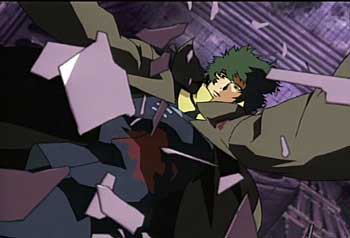by Luis Reyes
|
Melissa Charles: And in tender moments, our director would cry. She would get teary eyed. We're used to coming into
the studio and working through scripts methodically. But with this show we all had to double take. We had to really look at what
was going on.
Williamson: I had fun showing it to people. It was "Ballad of Fallen Angels" that did it for me, when Spike
walked into that church and the music started and Vicious screamed out, "Why are you still alive?" And that slow motion back
fall, and the music box music, and the flashbacks. Even watching it in Japanese, it blew me away.
Handler: When I do ADR scripts, I always watch the episodes ahead of where I'm writing so I know what's coming up
and I know how to set up the action. A writer really should. But with 'Bebop' I stopped doing that because I wanted to be
surprised. I was just having too much fun; I didn't want to ruin it for myself.
Lee: Melissa would do the same thing. She'd warn us not to read ahead.
Williamson: Yeah, I tried to keep it suspenseful. (To David) Did you have any idea what was going to happen to Spike?
Lucas: I had no idea. I cried.
Her royal highness, the precocious hacker Edward Charles: When Kevin Seymour from ZRO came up to me and said that he thought I'd be perfect for this part I didn't
know what to think. I have played my fair share of straight, serious characters. But the most successful ones were the
characters that were a little quirky or offbeat.
When I went in I had never met our director before, but we immediately had a great report. We watched a little of Ed
before I put a voice to it. I just wanted to see her movement and her playfulness. She came pretty organically to me at that
point. And though she is a girl, it was fun to play Ed as she thinks of herself, not a boy or a girl. She is just Ed, Edward.
Handler: When I saw the first Edward episode, I thought to myself, 'damn, they're going to bring a kid into this.'
They had this great group of adults, these hard-edged characters, a great noir feel. A kid would spoil it. And I wrote a note
to the casting department explaining that the tendency for an actor will be to play it too cute, syrupy cute, and that's going to
kill the series. You have to find someone who can bring a balance to it.
Charles: When she says bye to the crew, Melissa and I were both teary eyed. I think that at that point she had
grown up a little bit, she had learned all she could from the Bebop crew and she moved on.
Handler: And right before that Faye tells her that belonging is the best thing. And then Ed goes out to
find out where she belongs.
Sassy, Sarcastic Femme Fatale Faye Valentine Lee: In her first episode, 'Honky Tonk Woman,' she was so mysterious to me. This chick was so cool. Her whole vibe
and nature and cunningness and how she uses her sexuality - her intellect, her charm - or lack of - was just so compelling.
She's so comfortable in her skin that she isn't even aware of it most of the time, but can call upon it in a second. She
uses all of her charms to get what she wants. And she has a lot of bad motivations at times; she's naughty as hell.
Williamson: This is a woman who was cryogenically frozen for a period of time, has no idea who she is. And Wendee
was always able to find Faye's vulnerability in all of that, while still maintaining the sassiness and the sarcasm.
Did you know how your relationship with Spike was going to take shape? Lee: I thought at some point they would hook up. But the tension had been built for so long, I thought that if
they really did hook up it would ruin the vibe. Often times I would take visual clues from the art work about where Faye was
emotionally and mentally.
The incomparable Spike Lucas: The character was defined for me from the first episode. He's introduced as this badass, smarmy and sarcastic,
who doesn't give a crap about anything. But he also exhibits tidbits of vulnerability. In "Asteroid Blues" you see traces of
his vulnerability in his interaction with Maria - that he could actually have feelings for somebody else. That made him unfold
for me immediately as a multi-dimensional character. Prior to this I'd been used to playing monsters and, occasionally, heroes
and that kind of thing. But never anything with any depth. This was something I could actually act.
Handler: [To David] I remember you coming into it at the beginning of the series going "he is obviously the hero of the
series, he comes in doing Karate." And, at first, you gave him a 'hero' voice. And we talked to you about it saying, "That's
not what he's really like." Then you nailed it.
Lucas: Yeah, once I locked in, it was a joy to do - a very organic process. There are so many lines in there that
are just gems, things I've always wanted to say. I was putting a tape together, recently, of my work to send out, and I realized
that half the tape was Spike lines.
How would you explain Spike's relationship with Jet? Lucas: One of mutual respect and animosity, like brothers. I pictured them kicking the crap out of
each other then making up.
|




